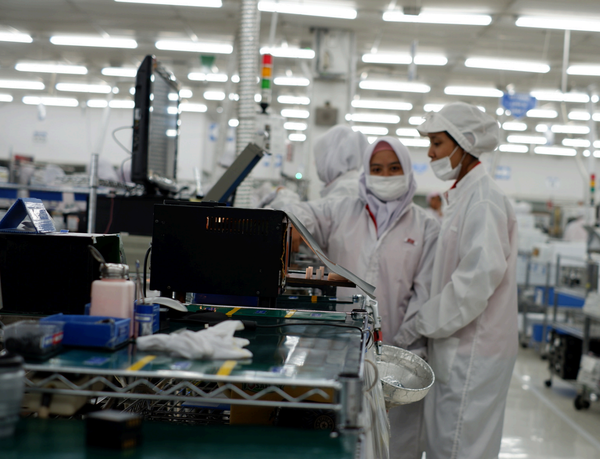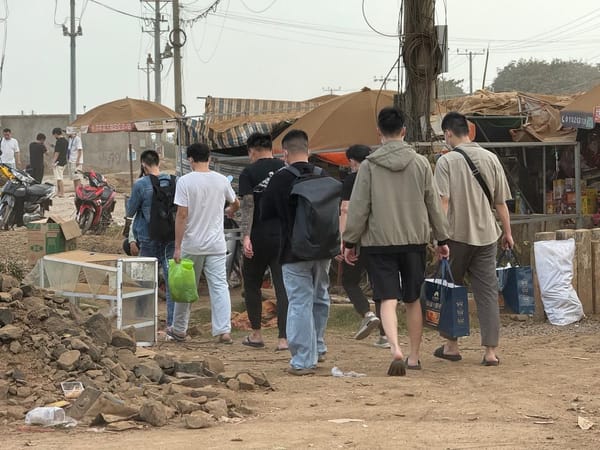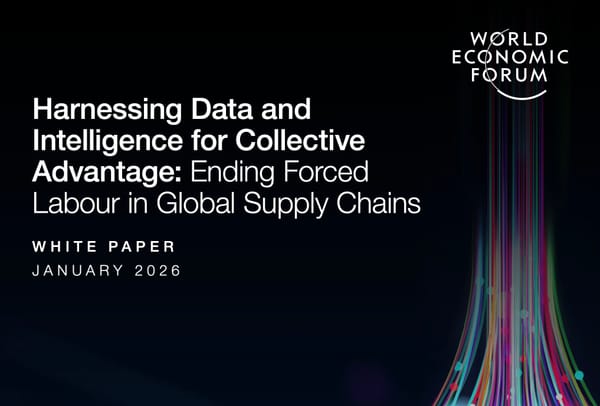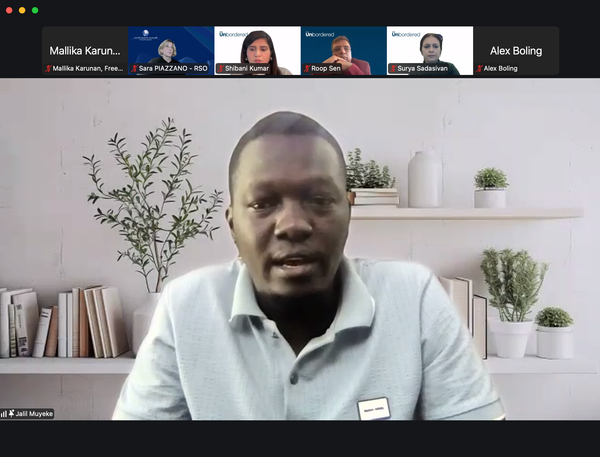Intersecting vulnerabilities must be addressed to reduce re-trafficking in East Africa
EHAAT data highlights re-trafficking risks including family instability and a lack of access to education, experts question the credibility of Cambodia’s anti-scam crackdown, and Walk Free warns of threats to the EU’s due diligence legislation.
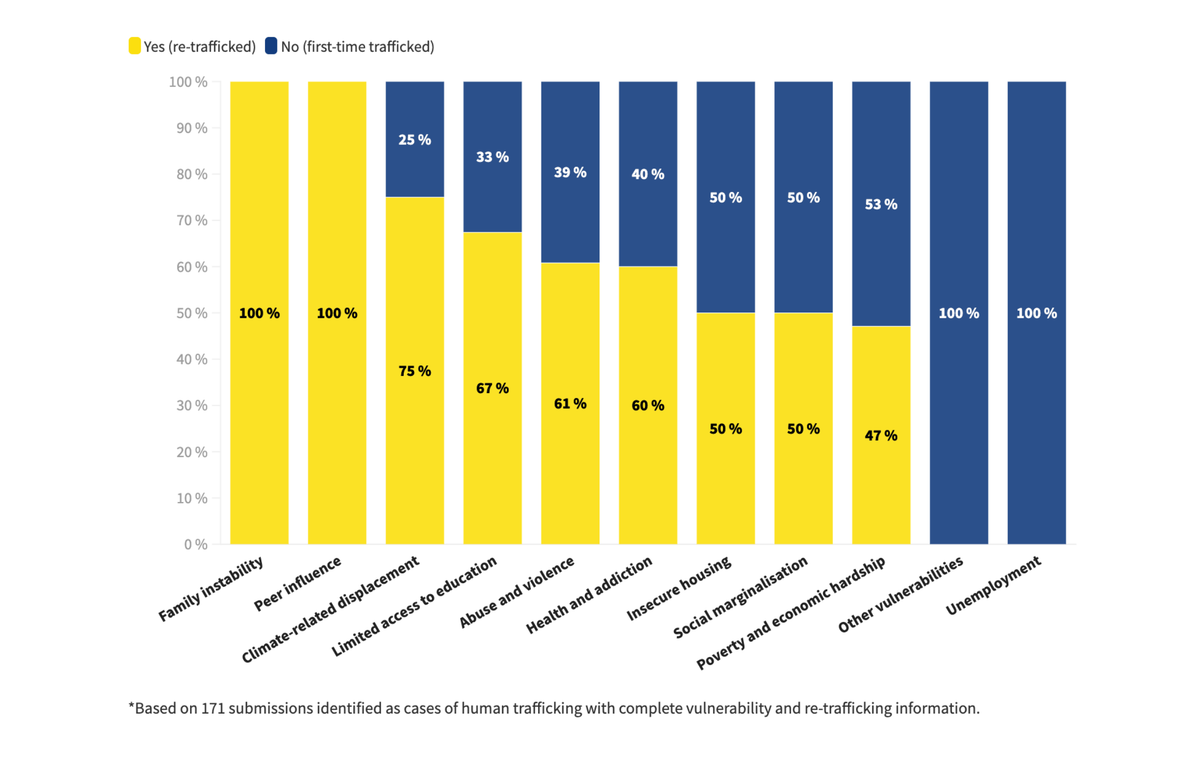
Our newly published regional routes mapping report, which explores patterns of unsafe migration and human trafficking across the East and Horn of Africa, highlights the persistence of re-trafficking in the region. Among the cases in which previous trafficking history was reported, nearly half of individuals had been trafficked before, according to data gathered by more than 50 civil society organizations. While this does not necessarily reflect the true extent of re-trafficking in the region, it underscores the issue as a pressing concern.
The report was developed by the East and Horn of Africa Anti-Trafficking (EHAAT) Network with the support of the Better Migration Management (BMM) Programme. Coordinated by Freedom Collaborative and funded by the European Union and Germany, it is based on nearly 400 route-based submissions gathered between January 2024 and April 2025.
The data shows distinct re-trafficking patterns across gender, age, education, and vulnerability indicators. Although slightly more trafficking cases involved females, male survivors were significantly more likely to have been trafficked before – 61 per cent of male clients had experienced re-trafficking, compared with 36 per cent of female clients. While these figures only reflect the available data, they point to the need for greater attention on the specific vulnerabilities men may face, particularly in the context of labour exploitation or coercion linked to repeated migration.
Re-trafficking risk also varied by age. Children and adolescents were disproportionately affected: more than 63 per cent of children under 12 and nearly 60 per cent of those aged 13 to 18 had been trafficked more than once. In contrast, only 10 per cent of young adults (ages 19 to 30) were reported as re-trafficked. These findings suggest that early exploitation may increase long-term vulnerability, potentially due to unresolved trauma, insufficient long-term support, or structural factors that continue into adulthood.
Education emerged as another key factor. Those with no formal education faced the highest re-trafficking rates at 69 per cent. This rate dropped to 38 per cent for individuals with primary education and 28 per cent for those with secondary education. While vocational training was associated with a slightly higher re-trafficking rate (46 per cent), no re-trafficking cases were reported among individuals with a university degree. Though not conclusive, this pattern indicates that education may play a protective role.
The report also identifies certain vulnerabilities that were more common among those who had been trafficked multiple times – every individual reporting family instability or peer pressure had experienced re-trafficking. Notably, re-trafficking was reported in 75 per cent of climate displacement cases and 67 per cent of those involving limited access to education. High rates were also observed among those reporting abuse and violence (61 per cent), and health or addiction challenges (60 per cent).
These patterns illustrate how layered vulnerabilities – especially those involving social instability, environmental displacement, and psychosocial stress – can heighten the risk of repeated exploitation. Individuals whose vulnerabilities were mainly economic, such as poverty or housing insecurity, exhibited somewhat lower re-trafficking rates of around 50 per cent.
While the data cannot establish causality, it highlights the importance of recognizing intersecting risks among survivors, especially those with histories of trauma or displacement. In particular, it underscores the need for long-term, trauma-informed support and individualized reintegration planning that addresses not just economic need but also the systemic and personal vulnerabilities that contribute to repeat exploitation.
Here’s a roundup of other noteworthy news and initiatives:
Former U.S. Ambassador-at-Large Cindy Dyer, who previously led the State Department’s anti-trafficking office, expressed concern over recent staffing cuts in this interview. She said the reductions could limit the government’s ability to meet its legal responsibilities and support efforts to address human trafficking both in the U.S. and abroad.
Cambodia has launched a series of nationwide crackdowns on cyber-scam operations, targeting compounds linked to trafficking, forced labour, and organized crime amid rising international pressure over human rights abuses. However, there are concerns the crackdown is aimed more at managing international perception than meaningfully dismantling Cambodia’s scam operations.
Walk Free has warned that the EU’s landmark Corporate Sustainability Due Diligence Directive (CSDDD) is under threat from both President Trump’s trade pressure and internal EU proposals to weaken the law. It is urging EU leaders to hold the line on key provisions, stressing that weakening the directive would undermine years of progress on corporate accountability and responsible business conduct.
A new study introduces the concept of the “conducive environment” to explain why exploitation is more likely to occur in certain contexts, driven by factors such as disruption, isolation, entitlement, and desperation. The authors propose a new definition of exploitation, which centers on the use of power or privilege to unfairly benefit at the expense of disadvantaged individuals, and argue that exploitation thrives where social bonds are either too tight or too loose.
Indonesian authorities have disrupted a cross-border baby trafficking syndicate linked to informal adoptions in Singapore, underscoring persistent gaps in protections for vulnerable mothers and failures in transnational enforcement.
The Global Initiative Against Transnational Organized Crime argues that sanctions can be effective tools if used not to eliminate trafficking and smuggling outright, but to strategically disrupt and reshape the criminal ecosystems that sustain them. As international momentum grows to address these illicit economies, particularly among G7 states, the organization calls for a redefined understanding of impact, long-term coordination, and integration with broader policy tools.
Freedom United is hosting an open conversation on state trafficking, turning the spotlight on the role states themselves play in pushing people into extreme exploitation and challenging the myth that trafficking is the sole domain of criminals and rogue states. The event takes place tomorrow, 23 July, at 17:00 BST / 12:00 EDT with guest speaker Dr Hyab Yohannes, UNESCO Chair on Refugee Integration and author of “The Refugee Abyss”. Please register here to join the conversation.

